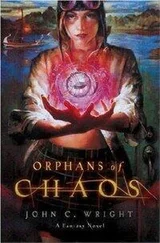With a third segment of mind, simultaneously, he queried his Coryphaeus, a partial mind tasked with counting and coordinating the motions of men and an-imals throughout the unmeasured vastness of Solar Ar-ray habitat space. Helion was old enough to remember the days when police minds and watchman circuits were necessary to ensure that people would not violate the property or privacy of another. His Coryphaeus also had a security submind, dating from the late Sixth Era, one of the oldest servants of the many in Helion's employ.
"Your visitor is now a hundred twenty-eight meters away from you, approaching along the main axial corridor of the command section, Golden Elder Strand Zero Center, Heliopolis Major."
"Here, in other words, within my private sanctum?"
"Yes, milord."
"Why was an intruder allowed to pass my doors? Why wasn't he stopped at the outer atrium, at the inner gate, at the command doors, or at my privacy doors?"
The Coryphaeus answered in its archaic accent: "By your instruction."
"My instruction... ? I told you all to guard my solitude."
"In the case where two orders contradict, I am to assent to the higher priority. This order is of the highest class of priority I recognize. I shall repeat the text."
Helion's own voice, blurred and faint as if from an ancient recording, came then, and the words were in an older rhythm, with words and expressions Helion had not used for four thousand years. He almost did not recognize the voice as his own, so different was it from his present way of speaking: "... I tell you, if ever when my best-loved friend should come again, whole or partial or anysomeway that be, hale him within, and let him pass. Let pass all doors and barri-cados, open firewalls, bridge delays, but bring him to me in all haste, or any who presents himself as him: he has priority higher than anything else I am doing or shall do hereafter, if only he will come again! If only he would call! Let be admitted any who come under the name of Hyacinth-Subhelion Septimus Gray. ..."
Then the Coryphaeus asked, "Those are your orders, eight thousand years old, but never revoked. What are your orders now?"
Hyacinth-Subhelion Septimus Gray. It was the name of a dead man.
Helion said, "How can it be Hyacinth?"
The Coryphaeus replied, "It was not said that this was Hyacinth, sir, only that this visitor is wearing the identity of Hyacinth, and in a fashion allowed by the masquerade. What are your orders?"
He heard the footsteps sounding on the balcony in the distance. Through an archway, lit by windows of fire to either side, a figure now came forward, and paused.
Helion rose to his feet, staring. With an abrupt gesture, he turned a mirror toward the figure, as if to amplify the view and see the other's face more closely; but then be stopped. It was a violation of Silver-Gray forms of politeness to examine a guest by remote viewers, or speak by wire, when the other came for a face-to-face meeting.
Helion saw only a Silver-Gray cloak, trimmed richly with gold and green, and a glimpse of pale white armor beneath. It was a fashion Hyacinth himself used to affect, in the days just after he had lost the right to be Helion, but he still dressed and looked as much like Helion as copyright and sumptuary laws would allow.
The hooded figure stood on the balcony, motionless, perhaps watching Helion as closely as the other watched him.
Helion said to his Coryphaeus: "I will receive the visitor. Admit him."
And a bridge extended from the rotunda across the wide space to the balcony.
Helion watched the white-cloaked figure approaching. He turned off his sense filter for a moment and examined the visitor's true shape: a squat, pyramidal body, made of carbon-silicon, approaching through an opaque, dense medium that filled this place. Helion was not using sight (normal vision was not possible here) but was using echolocation.
The body told him nothing. Anyone entering the special environment of the Solar Array would have to adjust his body to this configuration; materials and routines for making the transmogrification were found aboard every drop ship in solsynchronous orbit.
Helion turned his sense filter back on. The hooded figure now stood not ten meters away, at the foot of the little hill of tiered thought boxes on which Helion had his throne.
Helion spoke first: "Is this some ghost I see before me, stirred up from some unquiet archive? Wakened, perhaps, by some unexpected power Earthmind has unleashed on this, the last night before we drown our separate humanity in all-embracing glory? If so, go back! Return to whatever museum or noumenal casket had carried your dead thoughts through all these years. The dead have nothing to say to the living."
A neutral voice came from the hood. It was sent as text, but Helion's sense filter interpreted it as a voice, did not add any detail of inflection, pitch, or rhythm. It sounded like a ghost talking indeed. "The dead can allow the living to recall the lives they used to live. Dead loved ones can warn the living of loves they are soon to lose."
"Who are you?"
The cold and eerie voice came again: "Does my appearance frighten you? I had to assume this shape to be allowed to pass your doors. I cannot appear in my own shape; a terrible fate befalls whoever beholds me as I am!"
Helion squinted. "That is a line from one of Daphne's Gothic melodramas. Owlswick Abbey-she wrote the scene flowchart script."
"Many name her as the finest authoress of this time. I do her no dishonor to speak words she invents."
Helion, with deliberate slowness, resumed his seat, and now he leaned his elbow upon his throne arm, hid-ing a half smile behind his knuckle, looking up from beneath his brow.
"And what is this warning you come to bring me, old ghost?"
"Just this: Do not lose your son, Phaethon, as you lost your bosom friend Hyacinth. Do not lose yourself. Phaethon knows the dying thought of your former self: you and he spoke just before you died, during a storm when no recording systems were alert. With that thought you can reconstruct your memory by extrapolation; you can become what Helion would have been, had be lived. The Curia will call you Helion and grant you his name and place and face and property. Otherwise, you are Helion Secundus, and Phaethon takes all your fortune with him into exile; this Solar Array, He-lions house and memory caskets, riches, copyrights, thoughtrights, everything! But if you agree to loan Phaethon funds enough to buy his starship's debts, and give him once again clear title to the vessel, he will tell all he knows, or, if that fails to make you into Helion, he will award to you your fortunes nonetheless." Helion stared down for a time at the robed and hooded figure. Then he let free a sigh, and spoke in a tired tone: "Daphne, you know I cannot agree to those terms. I swore, long ago, to uphold the establishment of the College of Hortators, as our only dike against the tide of inhumanity which waits to inundate us.
That oath I shall not breach, not even to regain my true self again, not while I love honor more than life."
Daphne threw back the hood she wore, and signaled a waiver of her masquerade. Helion saw her face and heard her voice. "You are now in exile if you knowingly consort with me," she said. "But I think you should join us: Temer Lacedaimon is here, outside, beyond the pale, and so is Aurelian Sophotech!"
"What?!!"
"Yes!"
"That means the Transcendance ..."
She shook her head, her smile flashed. "Will not include the Hortators. They will not be in our future, then, will they? Or will you join the boycott yourself, and let the future you dreamed up, the one the Peers love so much, just go to waste, unheard?"
Helion frowned. "I should cut you out from my sense filter now, and hear no more of this ... but... Aurelian in exile? He communicates with the Earth-mind. Is she in exile now, too?"
Читать дальше










